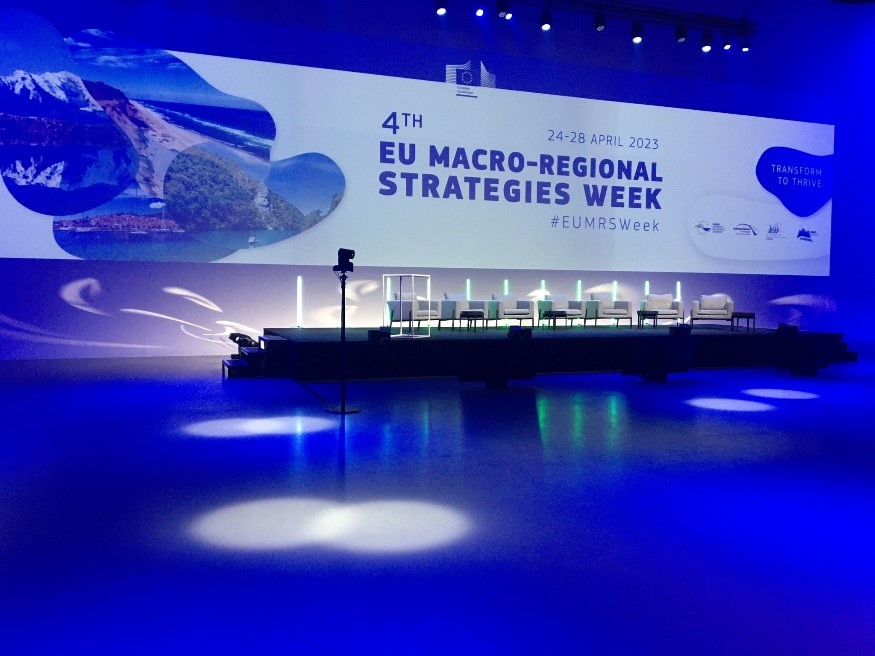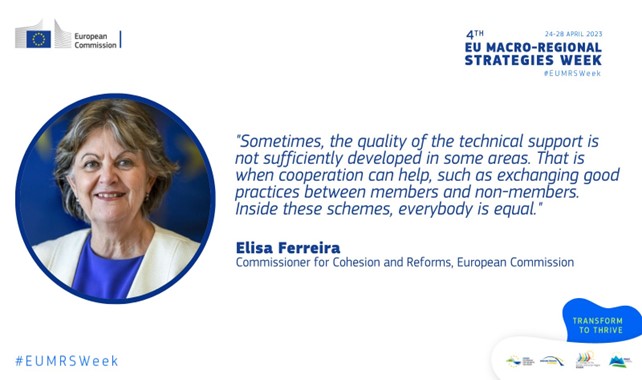
The aim? “Transform to thrive”. Transforming deeply our ways of cooperating, and of making public policy, to thrive towards the green and digital transitions anchored in a territorial reality. The EU macro regional strategies’ representatives from 19 member states and 10 partner countries took part in this 4th edition to ensure that cooperation actions are boosting skills, energy security and transition and that they are benefiting from adequate funding.
Macro regional strategies: Macro-regional strategies serve as open and agile platforms for strategic networking. They help to coordinate joint policies and actions far beyond physical or cultural barriers. A broad range of people work together on thematic platforms and processes to define concrete work plans that ultimately shape cooperation on the ground. As such, they make cooperation meaningful and their macro regions stronger, more resilient, and attractive to live in, everywhere and for all. Four EU macro-regional strategies, covering several policies, have been adopted so far:
All four macro-regional strategies are accompanied by a rolling action plan which is regularly updated in light of new, emerging needs and changing contexts. The four macro-regional strategies concern 19 EU member-states and 10 partner countries. More info
Welcome onsite!
We love Green: One of the highlights of the EU MRS Week was energy security and transition, so it was important that the event’s location should symbolise how regions in Europe will transform to implement the EU Green Deal. What’s best than the Event Lounge, a former cinema studio in Brussels, which now welcomes international events. It is fully aligned with the European green requirements: a renovated area, which uses renewable energy with solar panels on the roof delivering 70% of the energy needs of the building. Most of its furniture is made of recycled material and the Lounge practices circular economy, offering guests a whole modern area. Left-overs from lunches and dinners are collected by cargo-bike to be distributed to various local associations.
#StandWithUkraine: This 4th edition paid a particular tribute to Ukraine. If the whole Europe Union is mobilised to keep solidarity high with Ukraine, it’s been a year that macro regional strategies are playing a particular role in cooperating with Ukrainian authorities, especially in the framework of the Danube Strategy, and the Interreg Danube Programme in which Ukraine participates.
To honour the sad anniversary of the full-scale Russian invasion, the exhibition On the edge of the future displayed at the #EUMRSWeek is the result of the collaboration of Ukrainian artists Sergiy Tkachenko and Serhiy Vilganovskiy. The artists sought to depict the horrors of this war but also the heroic struggle of the Ukrainian people from 2014 in Donetsk. As pointed out by Nadija Afanasieva, Director of Ukrainian Institute for International Politics (UIIP), Danube Strategy, Support team of Ukraine National coordinator “This exhibition is important for Ukraine, to be heard from different channels. Art is one of them, especially within the context of the EU accession. We need not only to be heard but also to be understood”.
In the macro regional strategies, Ukraine was heard and understood. While Ukraine was taking over the Danube Strategy Presidency in 2022, part of its territories started to be bombarded by the Russian troops, but the country managed to carry on its role of presidency successfully. In addition, negotiations with Ukraine continued in order to adopt the Interreg Danube Programme at end of 2022. Today, Ukrainian beneficiaries have access to a total budget of EUR 665 million of Interreg Funds (this refers to the total budget of Interreg funds allocated to neighbouring countries participating to the Interreg Programmes 2021-2027) for projects for a smarter, greener and more social Europe. Cooperation actions will particularly support the Ukrainian needs in the field of skills recognition. At the occasion of the European Year of Skills, Nadjia stated ‘For Ukraine, we need the development of digital skills. We really need to think on how we re-integrate the people who are injured, especially the soldiers who are coming back to social life. Some of them before the war were businessmen, and not soldiers. The Russian invasion changed their situation as they have lost their capacity to continue their work as before. We are thinking on how we are reskilling Ukraine and we are ready to hear from our EU partners to help recognising the skills and the professions.”. If re-skilling Ukraine seems to be a priority for the country, it is also an important issue for the EU, to maintain adequate education for the jobs needed.
#EUYearofSKills. This year’s edition at the #EUMRSWeek also focused on skills in the macro regional strategies. While the green and digital transition opens up new opportunities for people and the EU economy, it creates strong demands on educational systems. Europe is facing up to 15% of youth unemployment in some of the regions in the Adriatic and Ionian Strategy and of the Danube Strategy. How can we adapt skills to boost jobs? As Anja Filipović , representative of the Danube Youth Council, stated ‘We need more visibility of Erasmus, and in the Danube, we should allow young people to have training opportunities for the jobs in the region. This will help to reduce brain-drain and it will increase prosperity of young people in their home environment.’ Fighting brain-drain is also one of the priorities in the Adriatic and Ionian strategy, as the public authorities there are now working on how to harmonise skills recognition. Therefore, The plenary session on skills addressed the opportunities available to macro regional strategies: the Pact For Skills by the European Commission, supports public and private organisations with upskilling and reskilling, so they can thrive through the green and digital transitions. Macro Regional Strategies can also benefit from the new regional dimension of the pact, that encourages new regional partnerships. Another opportunity are the Centers for Vocational Excellence implemented at local level, to build local skills ecosystem on innovation, regional development and to bring all partners like SMEs or academia, together.
Enhancing energy security and transition in the four macro regions: Europe is in the middle of a full-blown energy crisis with very high electricity and gas prices registered since September 2021. The Russian invasion of Ukraine is increasing concerns and generating volatility while the EU is seeking demand reductions for gas and electricity to offset lower and sanctioned Russian supply. Several initiatives are taken at EU level, such as the RePowerEU Plan, in order to face these challenges. During the panel discussion, representatives of the four macro regions highlighted their role in tackling energy security and accelerating clean energy transition through projects involving national and regional levels, but also through the community-led approaches, such as renewable energy communities. Today, macro regional strategies have the power to deploy renewable energy, like off-shore set up in the Baltic Sea Region, or to increase the use of hydrogen in the Alps. These new measures required planning, cross-border coordination and effective decisions. This is what brings macro regional strategies together.
Ensuring appropriate funding for cooperation actions: Macro-regional strategies address issues requiring several countries to cooperate based on a cross-sectoral and multi-level governance approach, they facilitate the implementation of core European political initiatives across their territories aligning and coordinating them with regional and local initiatives.
The last thematic session of the EUMRSW tackled the core issue in the implementation of macro-regional strategies: the development of actions on the ground and the financial resources required. The strategies provide a framework, but without financial means change will not happen. During the panel, the four panellists from the four macro-regional strategies, together with DG REGIO Directorate D Director Mr. Tokarski, exchanged on identifying common investment priorities, elaborating joint actions, and preparing the ground for joint implementation. Examples included the network on green hydrogen in the Alpine strategy, clean shipping in the Baltic strategy, energy efficiency in the Danube strategy and sustainable blue economy in the Adriatic and Ionian strategy.
EU macro regional strategies: bottom-up process and political support. It’s been more than 10 years since the first macro regional strategy started operating to coordinate EU policies at the regional level, to create space for stakeholders and civil society, to bring up their concerns and to shape their policies. What makes macro regional strategies special is their ability to bring political level in line with citizens’ needs through policy dialogues, expert groups exchanges, and thematic clusters. When Christian Danielson, Swedish State Secretary for EU affairs, says ‘We need to create the right environment for the economy to grow, for competitiveness to thrive so people stay in their regions’, it echoes automatically the stakeholders sessions that took place two days earlier in the week on skills, for example. In macro regional strategies, all actions are taken at all levels of governance.

To know more about the macro regional strategies, follow the webpages